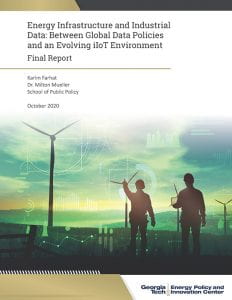Researchers: Milton Mueller (PI), Karim Farhat
 Industrial data (ID) has the potential to play a key role in finding efficiencies in energy markets and thus lower rates for consumers. This study explores strategies for the energy sector in the Southeastern U.S. region. The goal of this work is to provide energy executives and policy makers with recommendations that will make the best use of industrial data in the Southeastern U.S. energy context.
Industrial data (ID) has the potential to play a key role in finding efficiencies in energy markets and thus lower rates for consumers. This study explores strategies for the energy sector in the Southeastern U.S. region. The goal of this work is to provide energy executives and policy makers with recommendations that will make the best use of industrial data in the Southeastern U.S. energy context.
‘Big data’ is at the heart of an ongoing, industrial paradigm shift often touted as the fourth industrial revolution. ID increases efficiency and allows the innovative bundling of products and services. This is no less true in the energy sector than in other domains, yet the unique regulatory, operational, and supply chain structures of electric power providers creates some distinct dynamics. The increasing rate of efficiency by which energy and raw materials are being converted into useful work—while nothing short of revolutionary—has significant implications for the future of the energy sector as business decision-makers continue to leverage ID to drive their firms’ competitive advantages. The realm of industrial data within the energy sector encompasses a broad ecosystem involving many stakeholders. Within this construct, we find that:
- Investor-Owned Utilities (IOUs) could better leverage data analytics to maximize efficiencies;
- ID could lead to better alignment of incentives between utilities and policy/regulation;
- Methods to facilitate market entry for local third-party energy service providers could benefit the regional economy and to avoid ceding leadership to foreign or out-of-state competition;
- More collaboration during the standards deliberation process is warranted (in particular between OEMs and energy providers);
- ID and energy stakeholders have an obligation and opportunity to improve regulations for Critical Infrastructure Protection (CIP) with future implications on grid cybersecurity;
- Coordination and R&D among utilities, policymakers and research institutions can enhance and accelerate knowledge diffusion and beneficial outcomes for owners, consumers, and the environment.
